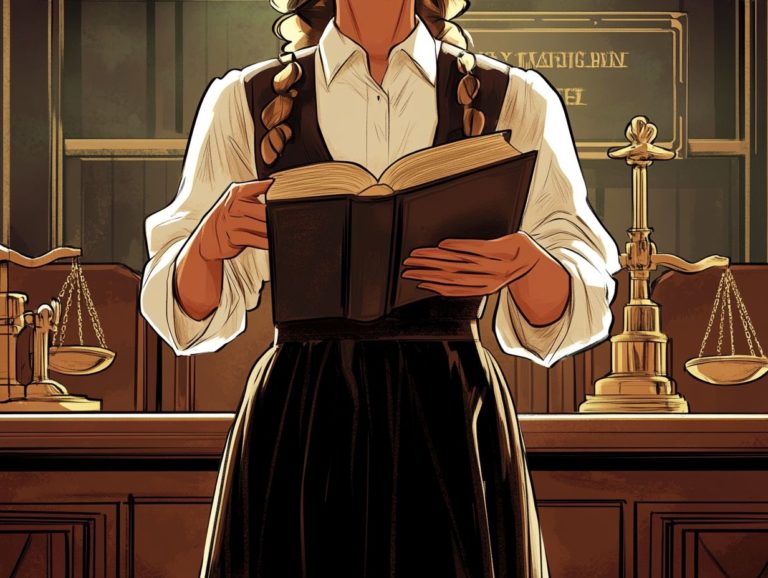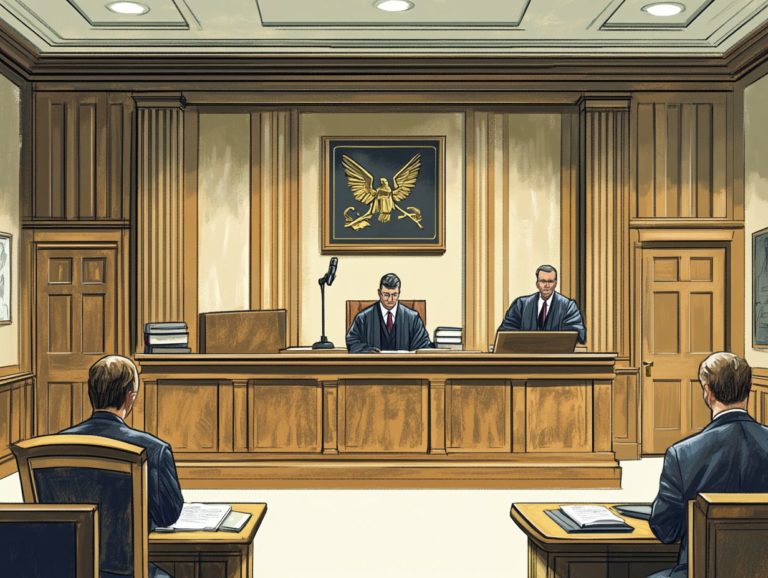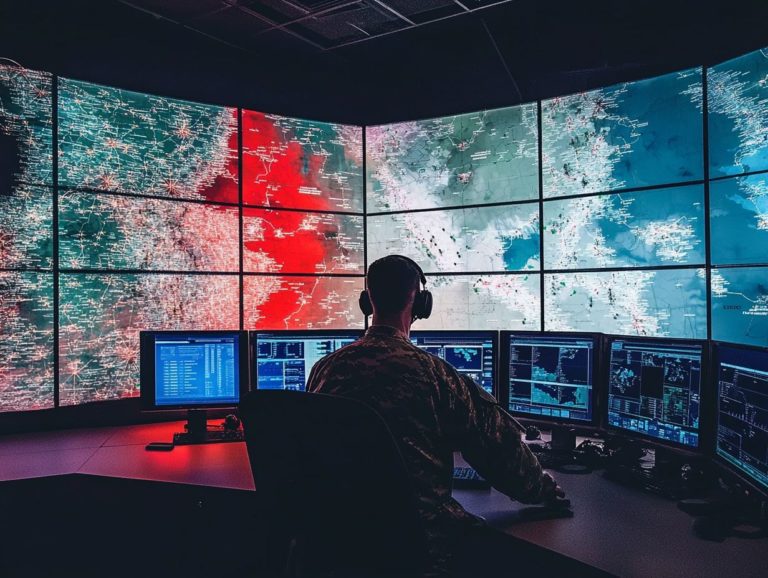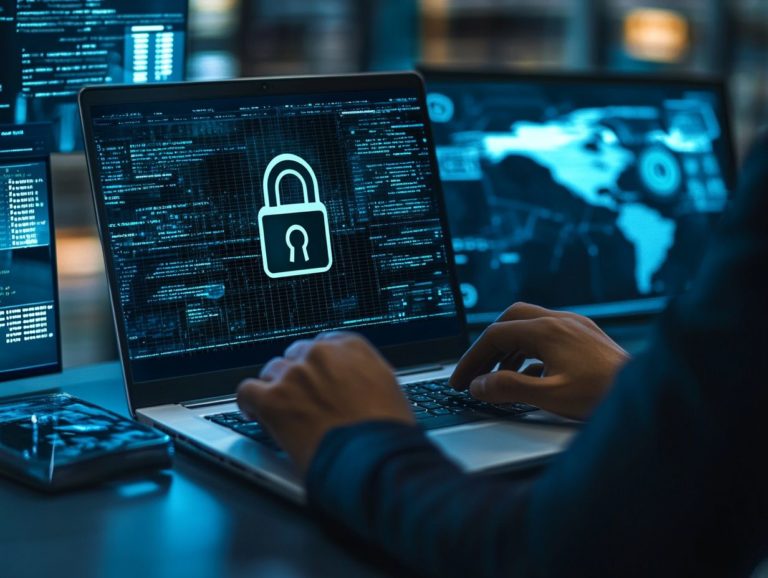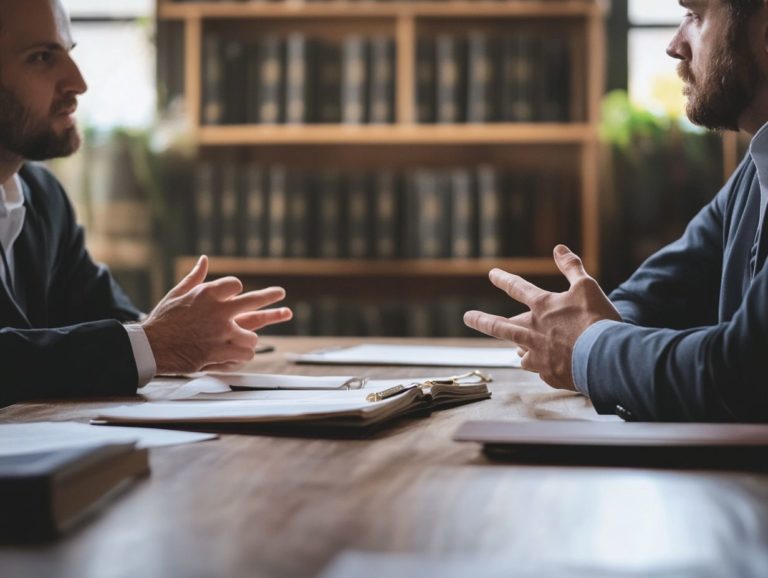Understanding the Role of the Jury in Defense
The jury system is essential to the justice process, acting as a cornerstone of a fair trial.
This article delves into the history and purpose of juries. It guides you through the intricacies of jury selection from eligibility to the voir dire process. You ll uncover the responsibilities jurors take on in defense cases. Learn how they evaluate evidence and appreciate the significance of deliberation in reaching a verdict.
Discover how juries shape justice today!
Contents
Key Takeaways:
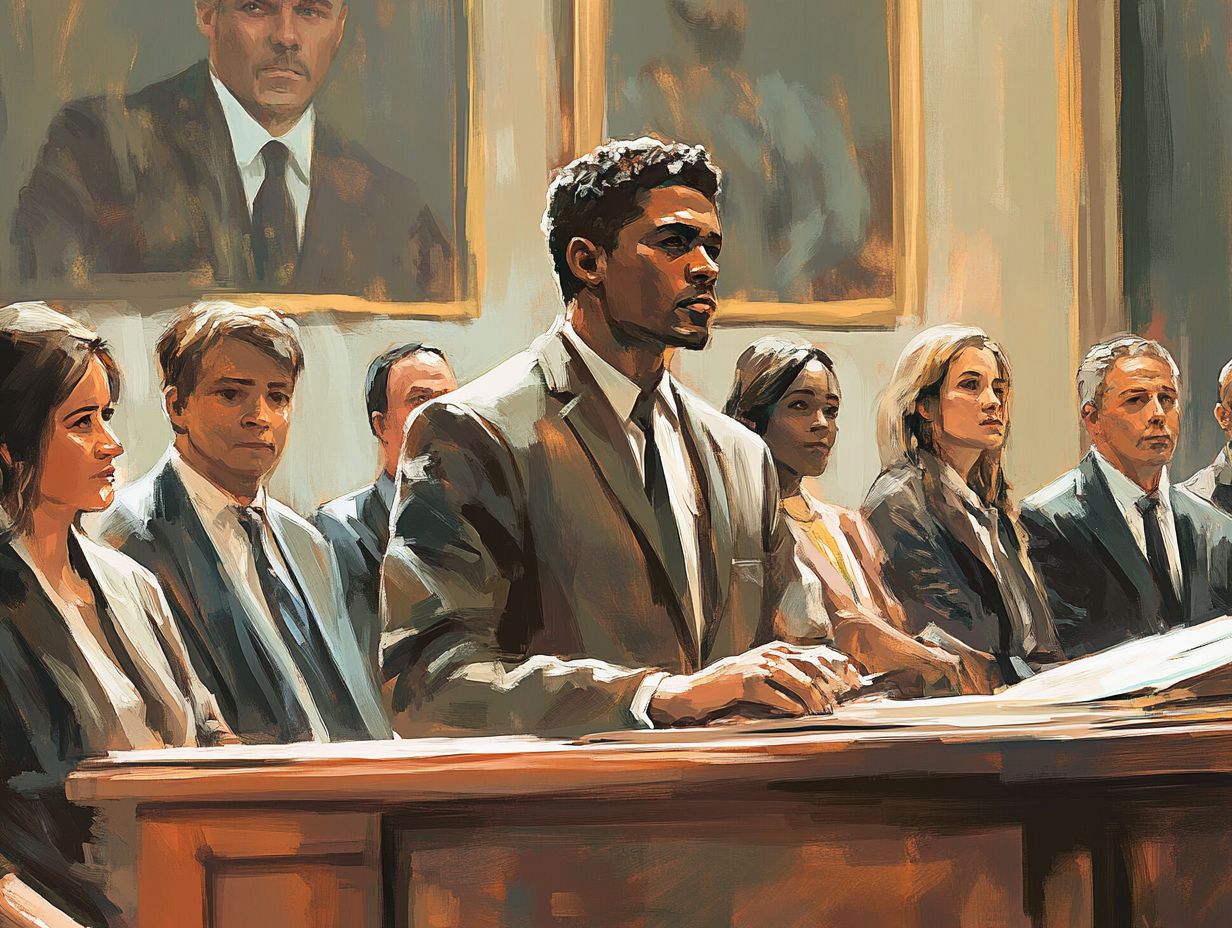
The jury system is an essential component of the legal system, dating back to ancient times. Its purpose is to ensure a fair and just trial for the accused.
The jury selection process screens potential jurors for eligibility and impartiality. This occurs through the voir dire process, which is crucial for maintaining a fair and unbiased jury.
As a juror, it is important to understand your responsibilities and duties. You will evaluate evidence and assess witness credibility to make an informed decision during deliberation.
The Importance of the Jury System
The jury system is essential to the American legal framework. It embodies the core principles of justice and fairness laid out in the 6th and 7th Amendments of the U.S. Constitution.
By relying on the collective decision-making of jurors, the system safeguards the rights of defendants. It also demands that the prosecution present compelling evidence to substantiate their claims.
This collaboration among jurors, judges, attorneys, and various legal entities is crucial in achieving a just verdict in both civil and criminal cases. In San Bernardino County and across California, the jury system reflects the community’s active participation in the legal process.
This underscores its vital role in maintaining public trust and upholding the tenets of justice.
History and Purpose of Juries
The history of juries stretches back to ancient times. It evolved from early forms of communal decision-making into the structured jury system you recognize today.
This system plays a vital role in safeguarding defendants’ rights within the criminal justice framework. Its evolution mirrors a broader societal shift toward valuing individual rights and impartiality in legal proceedings.
In the early days, communities gathered to resolve disputes. Biases often swayed outcomes during these gatherings.
However, this practice transformed significantly over time, particularly in England with the emergence of the Magna Carta in the 13th century. This document laid the groundwork for a more formalized legal structure.
As the jury system matured, it became a cornerstone of democratic societies. It ensures that defendants receive fair trials administered by ordinary citizens.
This essential role not only promotes justice but also bolsters public confidence in the legal system. It fosters a sense of accountability among those in power.
Selection of the Jury
The jury selection process plays a pivotal role in ensuring a fair trial. It begins with the formation of a jury pool, followed by a meticulous voir dire process.
During this phase, both the defense attorney and prosecutor evaluate potential jurors. They assess their suitability and impartiality. This careful scrutiny is essential for upholding the integrity of the judicial system.
Eligibility and Exemptions
In California, you must meet specific eligibility criteria to serve on a jury. Certain exemptions may apply to ensure that the jury selection is fair and represents a diverse cross-section of the community.
To be eligible, you need to be at least 18 years old and a resident of the county where you are summoned. This highlights the importance of local representation.
Legal qualifications, such as being a U.S. citizen and not having serious criminal convictions, are crucial in determining your suitability as a juror.
Common exemptions include those for caretakers, students, and active military personnel. These are designed to alleviate undue hardship for individuals with significant obligations.
These criteria and exemptions aim to balance civic duty with individual circumstances. They ensure that juries are both competent and representative.
Voir Dire Process
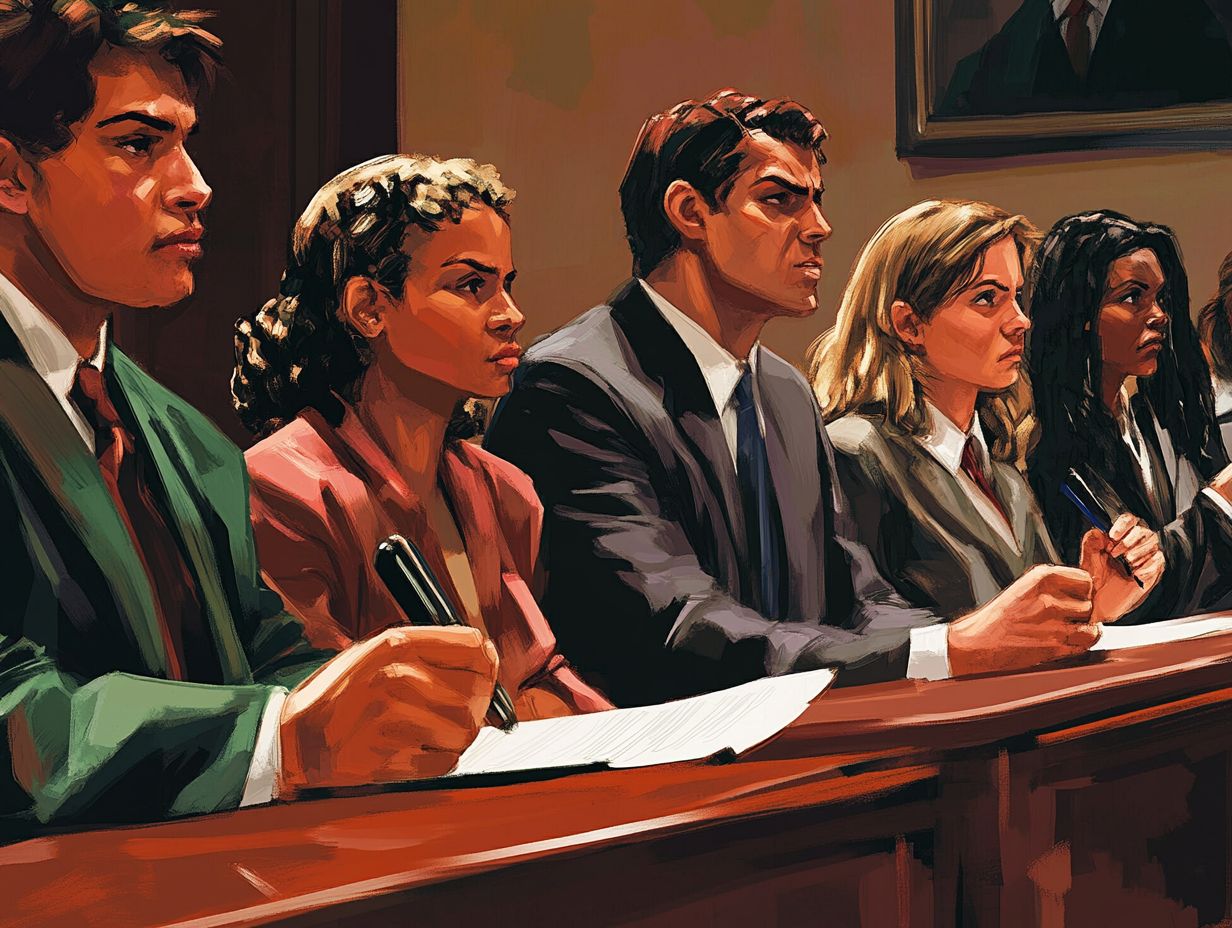
The voir dire process is an essential part of jury selection. As an attorney, you will question potential jurors to determine their impartiality and suitability. This is also your chance to exercise peremptory challenges, allowing you to exclude jurors who may have biases.
This procedure guarantees a fair trial and helps you assemble a jury that aligns with your strategic vision for the case. During voir dire, you ll ask questions to explore personal backgrounds, beliefs, and opinions regarding the case. This allows you to assess the jurors biases effectively.
If you represent the defense, your goal will be to identify jurors who may show sympathy or understanding towards your client. Conversely, as a prosecutor, you ll seek individuals who can uphold the law without any preconceived notions.
Peremptory challenges are critical in this process. They grant you the ability to dismiss potential jurors without needing to provide a reason. This power significantly influences the demographic and ideological makeup of the jury, impacting the course of the proceedings.
The Role of the Jury in a Defense Case
In a defense case, the jury plays a crucial role. They meticulously evaluate the evidence presented and assess witness credibility. Ultimately, they arrive at a verdict: guilty or not guilty.
This decision profoundly impacts the lives of everyone involved in the criminal proceedings.
Responsibilities and Duties
Jurors carry significant responsibilities and duties. They must carefully evaluate the evidence presented and listen attentively to witness testimonies. Ultimately, they must make a verdict that reflects their understanding of the facts.
In this pivotal role, you must remain impartial and open-minded. Sift through various pieces of evidence, including documents and expert analyses, to understand the entire narrative.
Your discussions during deliberation are crucial. It s essential to interpret the information collaboratively and ensure that every member’s perspective is acknowledged and respected.
By doing this, you help keep the justice system strong! Recognizing that your collective judgment can profoundly impact the lives of those involved is vital.
Thus, as a juror, you not only serve the legal system but also uphold the principles of fairness and justice in society.
Evaluating Evidence as a Jury Member
Evaluating evidence stands as one of the most crucial responsibilities you will encounter as a jury member. It demands that you grasp the burden of proof and critically assess the credibility of the witnesses presented during the trial.
Your role is vital in determining the outcome, as the weight of your judgment rests on your ability to discern truth from presentation.
Understanding Burden of Proof
The burden of proof rests primarily with the prosecution. This means they must show that the defendant is guilty beyond a reasonable doubt a concept you need to grasp fully to perform your role as a juror effectively.
This standard is crucial in jury trials, acting as a safeguard against wrongful convictions. It ensures that the accused cannot be deemed guilty unless the evidence convincingly supports that conclusion.
As a juror, you will evaluate the evidence presented, weigh testimonies, and discern the credibility of witnesses. Always consider whether any reasonable doubts linger.
The prosecution is tasked with presenting clear, compelling evidence, from physical artifacts to eyewitness accounts. They must craft a narrative that eliminates any uncertainty.
Ultimately, your careful assessment of this burden can change lives! It will shape the trial’s outcome and uphold the integrity of the judicial system.
Assessing Witness Credibility
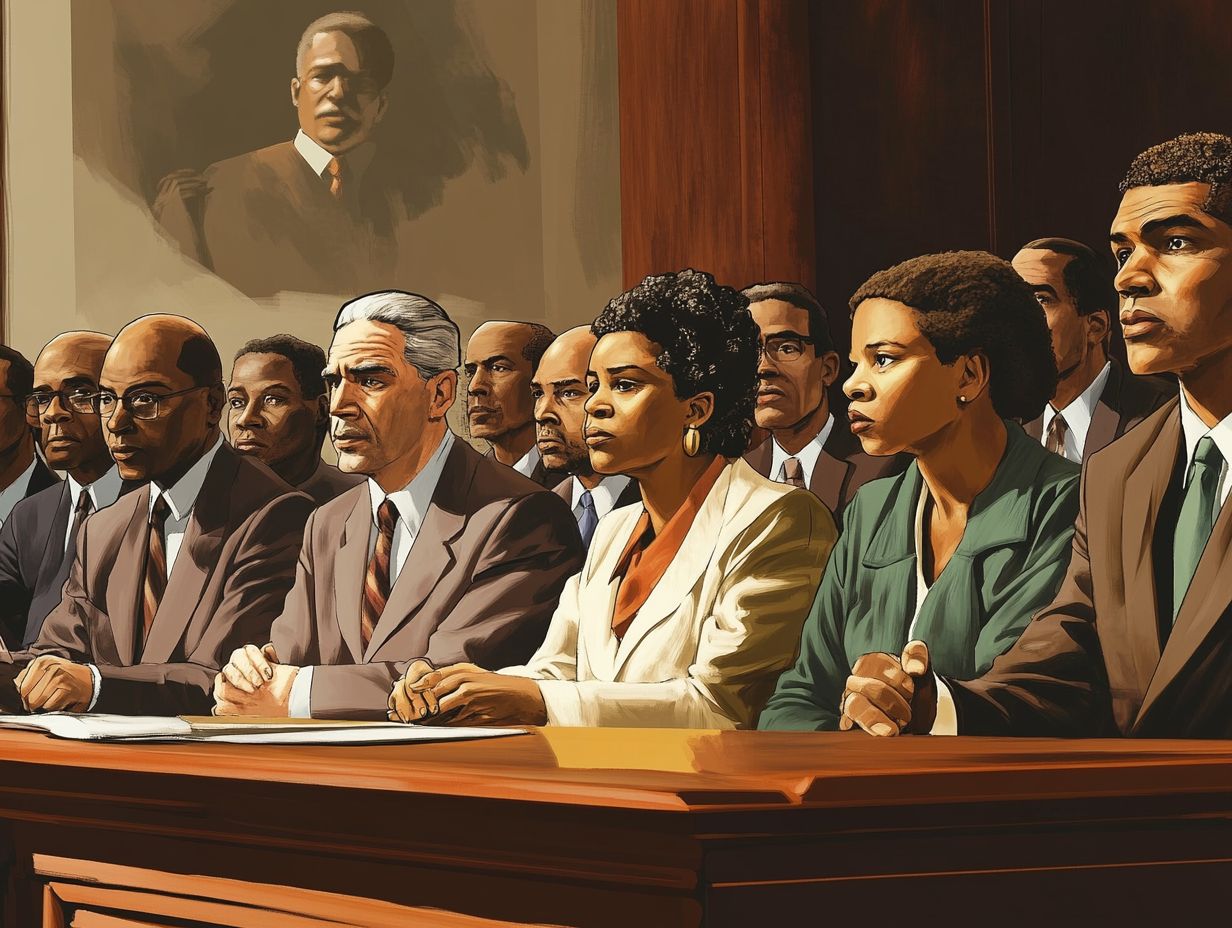
Assessing witness credibility is a critical task for you as a juror, requiring a careful assessment of the reliability and truthfulness of testimonies presented during the trial to make an informed decision.
This evaluation process involves several key factors that you must consider carefully. These include the consistency of the witness’s statements, their demeanor while testifying, and any corroborative evidence that supports or contradicts the testimony.
For example, a witness who shares their recollection clearly and confidently, aligning with other evidence brought forth in court, will likely earn your trust. In contrast, inconsistencies or unconvincing body language may raise red flags and introduce doubts into your assessment.
Ultimately, these evaluations shape your perceptions significantly and can heavily influence the final verdict, as they determine how trustworthy you find the evidence presented.
Deliberation and Decision-Making
Deliberation stands as a fundamental phase in the jury’s process. During this time, jurors engage in thoughtful discussions, sharing their perspectives and weighing the evidence at hand.
This collaborative effort aims to reach a consensus, guiding them toward a final verdict regarding the defendant’s guilt or innocence.
Communication and Consensus Building
Communicating well among jurors is crucial for a fair discussion. This allows you to express differing views, challenge assumptions, and work together to agree on a decision.
To facilitate this process, you can adopt strategies that promote constructive dialogue. Active listening is key, as it helps you grasp each other s perspectives and encourages respectful exchanges.
Creating an environment where everyone feels comfortable sharing their thoughts is essential for ensuring that all opinions are considered. The jury foreperson, often responsible for guiding discussions, can cultivate a culture of inclusion and openness, reminding everyone that diverse views enrich the deliberation process.
By prioritizing mutual respect and understanding, you and your fellow jurors can foster a dynamic where constructive conversations lead to a more informed and coherent final decision.
The Verdict and Its Impact
The jury’s verdict carries substantial implications for all parties involved. Your verdict can change lives. It’s not just a decision; it s a pivotal moment in the justice system. It shapes the defendant’s fate and opens the door to various consequences, including the possibility of appeals and additional legal proceedings.
Consequences and Appeals Process
The consequences of a jury’s verdict can be truly profound. These effects range from sentencing implications in criminal cases to the potential for appeals. As a defendant, you might find yourself in a position to challenge the decision based on trial errors or procedural misconduct.
These ramifications extend beyond the courtroom, shaping public perception and influencing the effectiveness of the justice system itself. A guilty verdict can lead to a sentence that might involve imprisonment, fines, or rehabilitation programs, creating a significant impact not just on you, but also on your family and community.
Conversely, if a jury acquits you, it highlights the vital importance of reasonable doubt and can restore a sense of justice for the accused. The appeals process acts as a crucial safety net, permitting a re-evaluation of the case to ensure fairness prevails, thereby reinforcing the fundamental principles of justice that safeguard against wrongful convictions.
Frequently Asked Questions
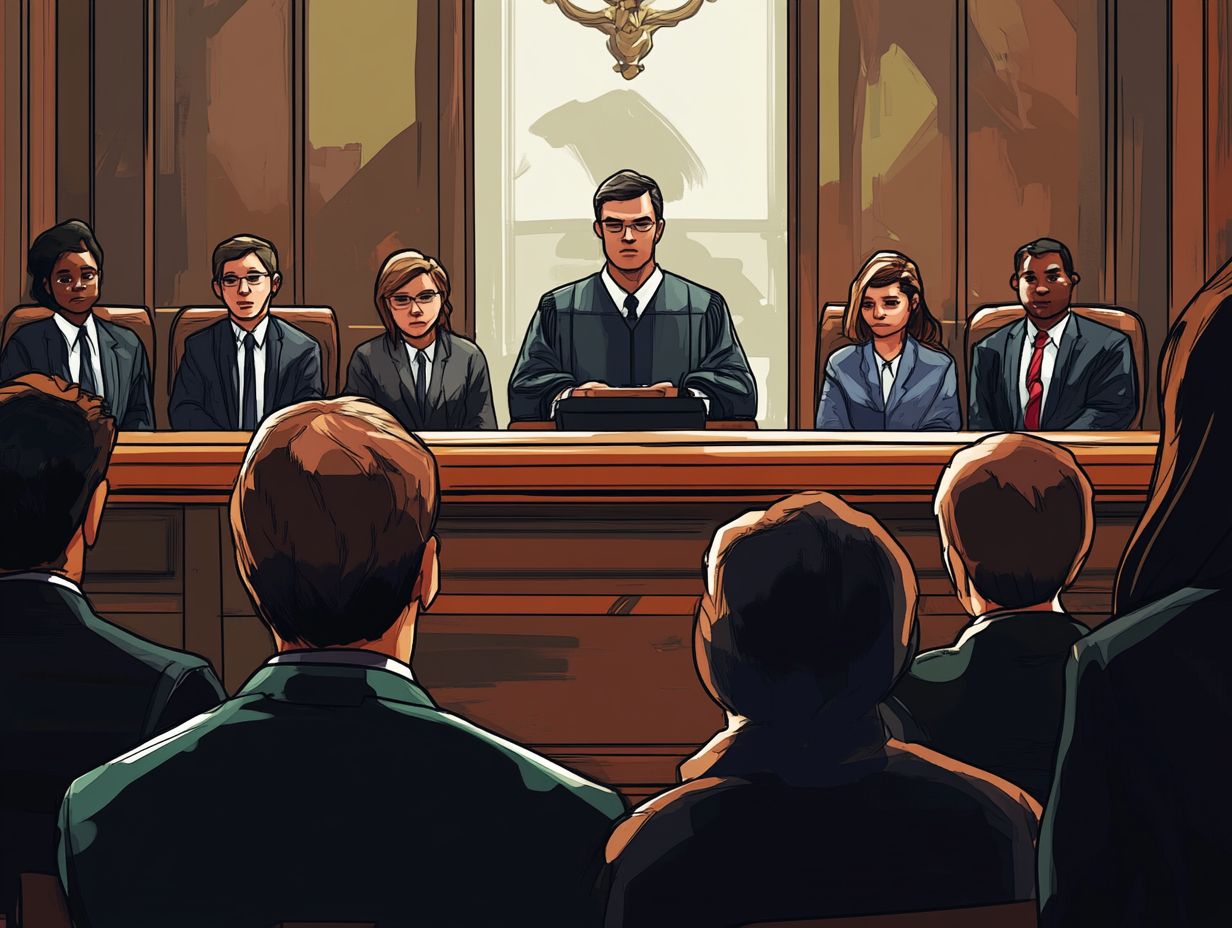
What is the role of the jury in defense?
The role of the jury in defense is to listen to all the evidence presented by the prosecution and the defense and to determine whether the defendant is guilty or not guilty based on the law, which can include using jury nullification as a defense.
How is the jury selected?
The jury is selected through a process called voir dire, which means “to speak the truth.” In this process, potential jurors are questioned by the judge and attorneys to determine their ability to be impartial and fair. Both the prosecution and defense have the right to excuse potential jurors.
Does the jury have any power in the defense process?
Yes, the jury can acquit the defendant if the prosecution hasn’t shown enough evidence to prove guilt. They also have the authority to convict if there s sufficient evidence of guilt.
What factors should the jury consider in a defense case?
- The jury should evaluate all evidence presented by both the prosecution and defense.
- They must follow the instructions given by the judge.
- The jury must set aside personal biases and base their decision solely on the evidence presented in court.
Does the jury have to reach a unanimous decision?
In most criminal cases, the jury is required to reach a unanimous decision. However, in some states, a majority vote may be accepted for certain lesser offenses.
What happens if the jury cannot reach a unanimous decision?
If the jury cannot agree, it is called a hung jury, meaning they cannot come to an agreement. The judge may declare a mistrial, and the case will be retried with a fresh jury, presenting a new chance for justice!
Curious about your rights in a trial? Reach out to a legal professional today!

